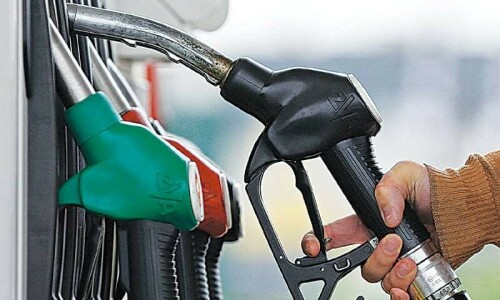ISLAMABAD: For the fourth consecutive fortnight, the prices of major petroleum products — petrol and high-speed diesel (HSD) — are estimated to go down by around Rs10 per litre from Sept 15 unless the government increases the petroleum levy.
Informed sources said the prices of petrol and HSD decreased in the international market by about $5 per barrel in the last fortnight. Depending on the final exchange rate calculation and existing tax rates, the prices of both petrol and HSD are projected to come down by Rs10-11 per litre.
However, the government could increase the rate of petroleum levy by Rs5 per litre to benefit from the lower price cushion and partially make up for FBR’s Rs100bn revenue shortfall in the first two months of the current fiscal year. In that case, the price cut would be around Rs5-6 per litre.
Hike in petroleum levy to halve relief for next fortnight
Officials said the average price of petrol had dropped in the international market to less than $76 per barrel from about $81 per barrel. Over the last fortnight, HSD declined to about $83 per barrel from $88.5. During the current fortnight, the import premium on petrol and HSD remained generally stable at $8.5 and $5 per barrel, respectively. On the other hand, the exchange rate remained range-bound.
The ex-depot petrol price currently stands at Rs259.1 per litre and HSD at Rs262.75 per litre. In the last pricing review, effective September 1, the government reduced the petrol and HSD prices by Rs1.86 and Rs3.32 per litre, respectively. Thus, the total reduction in petrol and HSD in the last three fortnights amounted to Rs16.50 and Rs19.88 per litre, respectively.
The petrol and HSD prices were increased by Rs17.44 and Rs15.74 per litre, respectively, in the first fortnight of July. Between May 1 and June 15, the prices of both petrol and HSD were reduced by about Rs35 and Rs22 per litre, respectively.
Petrol is primarily used in private transport, small vehicles, rickshaws, and two-wheelers, and it directly affects the budget of the middle and lower middle classes. On the other hand, most of the transport sector runs on HSD. Its price is considered inflationary as it is mainly used in heavy transport vehicles, trains and agricultural engines like trucks, buses, tractors, tube wells and threshers and particularly impacts the prices of vegetables and other eatables. The drop in petroleum prices is seldom reflected in fares and prices of essential commodities.
The government has jacked up the maximum limit of petroleum levy to Rs70 per litre in the finance bill to collect Rs1.28 trillion in the next fiscal year against Rs1.019tr collection during the last fiscal year, almost Rs150bn higher than the Rs869bn budget target.
Currently, the government is charging about Rs78 per litre tax on petrol and HSD. Although the general sales tax (GST) is zero on all petroleum products, the government charges Rs60 per litre PDL on both products, which usually impacts the masses. The government also charges about Rs18 per litre custom duty on petrol and HSD, irrespective of their local production or imports. In addition, about Rs17 per litre distribution and sale margins are going to oil companies and their dealers.
On the other hand, it charges Rs50 per litre on light diesel and high octane blending components and 95RON petrol used by the wealthy in luxury imported vehicles.
Petrol and HSD are the major revenue spinners, with their monthly sales of about 700,000-800,000 tonnes compared to just 10,000 tonnes demand for kerosene.
Published in Dawn, September 7th, 2024














































Dear visitor, the comments section is undergoing an overhaul and will return soon.